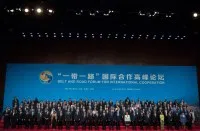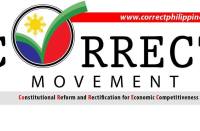Three days after delivering his annual State of The Nation Address where he promised tax reform and better regional wealth distribution via federalism in order to ensure a better future for the poor, Philippine President Rodrigo Duterte has criticised the Roman Catholic Crunch in The Philippines - aka The Deep Church, for operating a parallel taxation system which targets the poor who give their meagre means to a wealthy church.
Duterte described the collection of money by the Deep Church in the following way,
“There are two kinds of taxation here in this planet — the taxation of government and the taxation of the Church. When they begin to ask, ‘Where’s the money of the people, guys?’ And I said, ‘It’s government’s money, it’s the people’s money.’ Then I asked the same thing, ‘What happened to the money of the people that’s been given in three tranches?’ That’s my basic objection actually. I thought that we are poor”.
In other words, while Duterte has repeatedly stated that his government will account for the purpose and penultimate destination of every peso which goes into the government coffers and use taxation only to benefit the people directly, he feels the Church is far less transparent when accounting for the funds that some of the poorest give away in what amounts to a deeply unfair stealth tax.
Duterte continued by once again offering his vision of God which difference from that of the Deep Church. The President stated,
“As many people there are here, we have our own image in our mind of what God really looks like. I think that there’s a universal mind controlling the universe. He need not be named God, but at least there is somebody higher than us, controlling the universe or otherwise with the billions and trillions of planets and stars, we would start to collide with each other. Now the fact that Mother Earth has reached 4.5 billion years old, it seems that my God watches over us. I don’t know about the God of the others”.
When Donald Trump ran for office, he vowed to “drain the swamp” of Washington’s deep state. While Trump’s record on this is up for debate, what is clear is that Duterte has remained steadfast in his aim to diminish the power of institutions throughout the country that get in the way of the people’s health, happiness and prosperity. Whether taking on the elite political class of Imperial Manila, the corporate oligarchs who have ruined pristine places of beauty like Boracay, corrupt police, politicians and civil servants who are on the take from the narco-trade and inefficient officials in tax offices, Duterte’s anti-corruption drive has been vast and crucial to the long term well being of the nation.
But in taking on the wealthy, corrupt and politically meddlesome Roman Catholic Church, Duterte has decided to take on an institution that predates the existence of the modern post-colonial Republic of The Philippines. In taking on the Church, Duterte is taking on a symbol of the colonial mentality that for years has gotten away with using political movements for its own material gain as was thoroughly catalogued in the new book Altar of Secrets: Sex, Politics and Money in the Philippine Catholic Church by Aries Rufo.
Duterte is well away that an obscenely wealthy church in a country where many still go to bed hungry, is one with its priorities in all the wrong places. He knows too that scandals ranging from child molestation to adultery and involvement with the drug trade should not be allowed to be hidden by clerics behind the cross whose meaning such activities tarnishes. Duterte is also aware that for The Philippines to join other successful so-called Asian Tiger economies, the separation of church and state must be inalienable as it is in all other successful small and large economies in the region.
Duterte has also taken his battle against the Deep Church further by offering Filipinos a chance to open their minds that in many cases were forced shut by years of Deep Church dogma and in some cases by physical abuse. Duterte has joined a list of activists and artistic heroes from throughout the post-colonial developing world who embraced God and faith but rejected institutionalised organised religion as a relic of a colonial past.
For Duterte, The Philippines is capable of becoming a society where worldly wealth and interpersonal faith can exist harmoniously. For Duterte, The Philippines should be a place where spiritual figures are there to uplift and inspire rather than molest the bodies of young children and molest the political sovereignty of a legally secular nation. For Duterte, the last vestiges of the colonial mentality will only end when clerics begin working for the people rather than working for their own agenda that often times has little to do with God, charity or The Bible – in many cases the Deep Church’s agenda runs contrary to God, charity and The Bible simultaneously. Ultimately, Duterte seeks to give his people freedom balanced by lawful order where one’s religiosity, family life and future are a matter of conscience decided from within rather than dogma dictated to by institutions who refuse to change with the times.
Duterte’s recent statements are a further indication that his attacks on the Deep Church are not attacks on the beliefs of individuals but on an institution whose corrupt dealings with the poor, lack of attention to the condition of many poor Filipinos, history of abuse and doctrinal hypocrisy must be openly criticised rather than merely discussed behind closed doors. Duterte seeks a profound and holistic change for his country from all institutions whether the bureaucracy, the rice oligarchs, the polluters of the environment or the Deep Church itself. For Duterte, all collective or formal institutions holding back the development and enlightenment of the country are fair game.
Under President Duterte, the literally “holier than thou” Deep Church is now receiving the kinds of criticism that in the minds of millions of Filipinos was long overdue.




